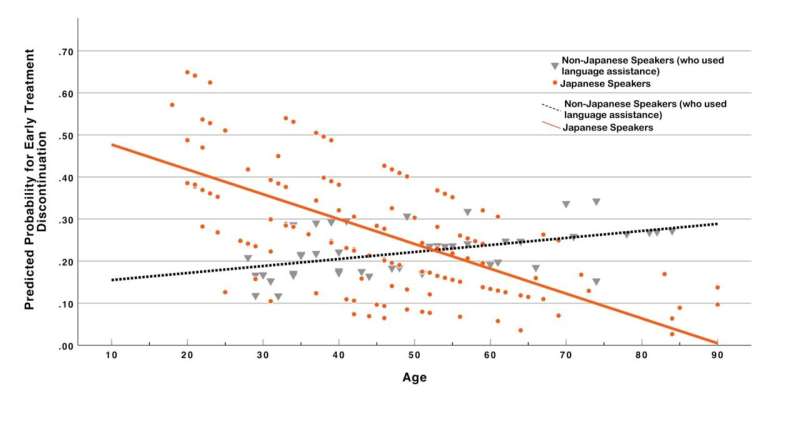This article has been reviewed according to Science X's editorial process and policies. Editors have highlighted the following attributes while ensuring the content's credibility:
fact-checked
peer-reviewed publication
trusted source
proofread
Investigating factors contributing to early dropout of psychiatric treatment among foreign residents

A research group has investigated the factors contributing to early self-discontinuation of psychiatric treatment among foreign residents.
The study revealed how patients' language proficiency influences early self-discontinuation of treatment. One notable finding was that relying solely on observed Japanese conversational fluency is insufficient for young patients in mental health care, highlighting the need for proper language assessment and language support services to reduce treatment dropout. These research findings were published in the journal "BMJ Mental Health" on July 4, 2024.
The study analyzed the medical records of 196 foreign patients aged 18 and above who visited the psychiatric outpatient departments at Toho University Medical Center Omori Hospital, Kawasaki Municipal Hospital, and Saiseikai Yokohamashi Tobu Hospital between April 2016 and March 2019. Among all patients, 25.5% self-discontinued treatment within three months.
It was assumed that Japanese conversational ability was the main factor behind self-discontinuation of treatment; however, the group that spoke Japanese and the group that did not had comparable dropout rates (26.5% and 22.2%, respectively). Treatment dropout rates were higher among younger patients and those with disorders other than schizophrenia spectrum disorders or neurotic disorders. These tendencies were particularly noticeable among Japanese-speaking patients.
Young foreign residents were found to have a high risk of self-discontinuing treatment early even if they speak Japanese. In conclusion, providing mental health care to foreign residents requires assessing language proficiency and preferences, and offering appropriate language support, rather than relying on the observed Japanese conversational ability during consultations.
The study was conducted by Professor Takahiro Nemoto and his research group from the Department of Psychiatry and Neurology at Toho University Faculty of Medicine, in collaboration with Visiting Professor Janice Tsoh from the University of California San Francisco Department of Psychiatry and Behavioral Sciences, who was invited under the "FY2023 Japan Society for the Promotion of Science (JSPS) Invitation Fellowship Programs for Research in Japan (Long-term)."
More information: Janice Y Tsoh et al, Exploring early discontinuation of mental health outpatient treatment: language, demographics and clinical characteristics among migrant populations in Japan, BMJ Mental Health (2024). DOI: 10.1136/bmjment-2024-301059



















